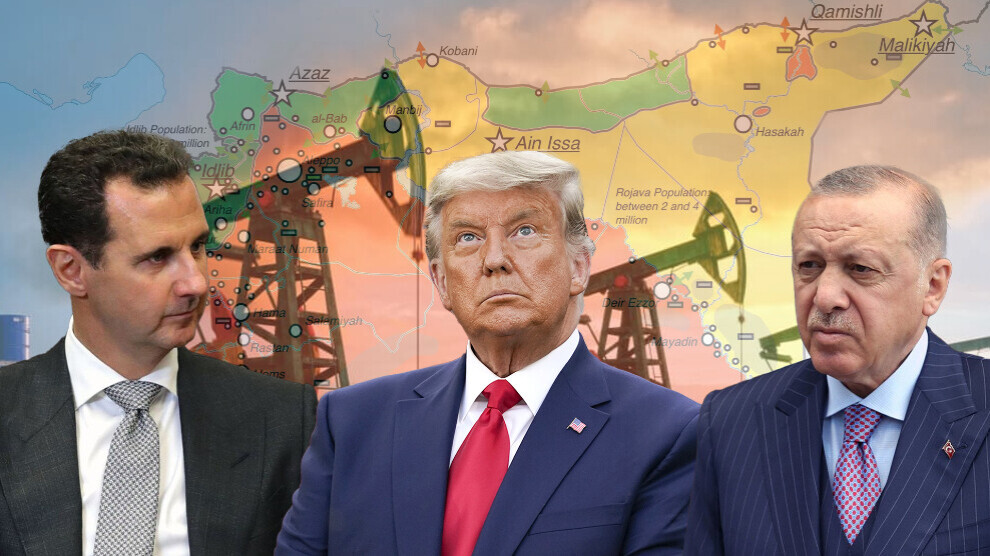Developments in the Middle East are at a level that excites observers. Contradictions, conflicts and searches are never ending. The Middle East has turned into a ball of contradictions and conflicts, but those who know the history of the region say that two fundamental problems play an effective role in these conflicts. These are the Palestinian question and the Kurdistan question. Kurdistan was divided between four states after World War I. After World War II, the state of Israel was established, and the Palestinians were largely expelled from their lands. Of course, Palestine and Kurdistan were brought to this state with the help and support of the imperialist powers.
As the first nation state to be established, Turkey pioneered the eradication and assimilation of the Kurdish people. The Turkish model was later adopted by Iran, Iraq and Syria. These four states have always been united when it came to the Kurds and have acted like seeking to destroy them. The status of Kurdistan, or rather its statusless state, has become a world system. Especially after Turkey joined NATO, this statusless state has deepened.
Turkey and the Kurdish policy
The Turkish state is playing the most influential role in the region and in the world to ensure that the Kurds remain without status. When demonstrations broke out in Syria in 2011, the Erdoğan administration immediately opened its borders and mobilised for the overthrow of the Bashar al-Assad government. The reason for such a quick action was again the Kurds. He assumed that Bashar's regime would fall. He immediately took a position in case the Kurds could take advantage of this situation and gain a status. Erdoğan thought, "Bashar will not last anyway, he will go like Gaddafi and others, and I will kill more than one bird with one stone". By supporting the Ikhwanis, he would have a large population in Syria and establish influence in the Middle East. He was dreaming of the Ottoman Empire and making expansionist calculations. He wanted to utilise the opportunity.
However, their calculations failed. Both the Kurds and the Assad administration resisted. The Kurds repelled ISIS and defeated ISIS together with the international coalition. The Assad government survived with the support of Iran and Russia. However, Erdoğan's calculations dragged Syria into a bloody maelstrom. Hundreds of thousands of people lost their lives and millions were forced to migrate. Syria, as a heavily wounded country, is still in the throes of it. Erdoğan, together with his racist partner MHP, continues to organise and plan evil.
Erdoğan's plans did not work out, and he reversed himself on many issues. He ended up begging Israel and prostrating himself before Arab states. But he did not give up his enmity against the Kurds and did not stop attacking them. He again conducted his negotiations with the US and European powers over the Kurds. It is the same in his relations with Russia. To summarize, he negotiates with the whole world over Kurdish enmity and tries to get support.
Erdoğan and the Syria policy
Erdoğan has been saying for some time that he also wants to normalise relations with Syria. For this, he had put Russia into play. The Putin administration was also having difficulties with the war it found itself in and the embargo. Previously, he had collaborated with Turkey, especially on the occupation of Afrin. They were accustomed to oppressing peoples for their own interests and to sell them off to each other. Despite Russia's attempts, Bashar al-Assad did not meet Erdoğan. He rightly said, "If I sat at the table with him, I would be endorsing his occupation in Syria". As a condition for a meeting, he suggested that Turkey withdraw its troops from Syria. However, his latest statement is different. He made this statement after Putin's special envoy's visit to Damascus. He said that they could normalise their relations with Turkey.
Syria’s change of attitude
Why did Syria change its attitude? This is an important issue that requires discussion. It needs to be monitored and researched. There will be elections in the US soon and there is a possibility that Trump will be re-elected. In that case, the US may withdraw from Syria and Turkey will be left alone as an occupier. Turkey actually does not want the US to leave Syria. All Erdoğan's pressure and criticism of the US are only about the Kurds. As long as the US is there, it will take time to crush and disperse the Kurds. The conjuncture may change, and a Kurdish status may emerge. He says to the US, "Leave the YPG and SDF and let me do what you want".
Should the US get out, Erdoğan would end up saying, "We will crush the Kurds, fine, but then I cannot stay in Syria. As Syria gets stronger, it will provoke Arab nationalism and make me unable to stay there. I cannot protect Idlib and al-Nusra etc. as I do now". As a matter of fact, he has no problem with selling these forces. In the end, if things don't go as planned, he could sell them too and get out of Syria. His main concern is primarily to finish off the Kurds and change the demographic structure on their borders.
Why did Bashar al-Assad change his attitude? His attitude is also related to these developments. "If the US withdraws, it will be easier for us to move on the Kurdish regions together with Turkey. I will seize the oil regions, etc. After the Kurds are finished, we will have no difficulty in coming to an agreement with the Turkish invaders," is his calculation.
It seems that there will be new mobilisations in the region!














